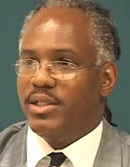Gov. Schwarzenegger can’t wait another year
09.11.08
Cross-posted from The California Progress Report
By Herman Atkins

Over 20 years ago, a woman was brutally raped and robbed in a shoe store in Riverside. To this day, no one knows who committed the crime. But because of other people’s mistakes, I spent almost 12 years in prison for his crime—until the Innocence Project used DNA to prove I was innocent. Even though I lost 12 years of my life and suffered the indignities and horrors of more than a decade in California’s prisons, I am one of the lucky ones. For most people, there is no DNA to prove their innocence and no free lawyers to help them.
Four bills that would help reduce wrongful convictions in California were introduced in the legislature this year, and two have finally made it to the Governor’s desk. The state’s budget crisis killed the other two bills even though they had very moderate price tags. Nonetheless, the two bills on Gov. Schwarzenegger’s desk are important first steps and he must sign them now.
Failing to enact these reforms puts public safety at risk. As in my case, when an innocent person is convicted, the investigation stops and the real perpetrator is often never found. We cannot wait one more year to take action to reduce wrongful convictions.
The first bill, SB 1589, would require corroboration for jailhouse informant testimony. Informants have good reasons to lie: they are getting something in exchange for what they say. Yet, they are persuasive. In fact, informants are the leading cause of wrongful convictions in death penalty cases. We already require corroboration for co-defendant informants; SB 1589 simply extends that same precaution to jailhouse informants.
The second bill, AB 2937, would provide more services to wrongfully convicted people and remove some of the hurdles to compensation for the innocent. Currently, wrongfully convicted people receive even less assistance than parolees who actually committed the crime. Indeed, my wife and I have established a foundation to provide assistance to wrongfully convicted people because the state does nothing. As the chair of the Council for the Wrongfully Convicted, I had the opportunity to testify before the California Commission on the Fair Administration of Justice about the difficulties we face after exoneration. My testimony led the Commission to recommend the reforms in this bill.
Also known as the Arthur Carmona Justice for the Wrongfully Convicted Act, AB 2937 is named after a brave young man who was wrongfully convicted at just 16 years old, and whom I had the opportunity to work with before he was tragically killed earlier this year. Arthur and I shared a couple of things in common: we were both wrongfully convicted based on mistaken eyewitness identification and police misconduct, and we also both had loving and dedicated families who fought for and supported us. Even with our strong support systems, we both struggled to cope with life outside of prison with virtually no help from the state that took our best years from us.
The Arthur Carmona Act would change that by ensuring that wrongfully convicted people have the same access to resources that ex-offenders receive when released from prison. It would also require that criminal records relating to a wrongful conviction are sealed, and would remove procedural hurdles to compensation for the factually innocent.
All of these reforms are based on recommendations by the California Commission on the Fair Administration of Justice, which spent the last three years studying our justice system and developing recommendations to make it better and more accurate. The Commission was created by the Senate in 2004, and the legislature has even passed similar bills based on the Commission’s recommendations in the last two sessions. But Gov. Schwarzenegger vetoed these bills in the past, causing even a commentator on Foxnews.com to lead with the headline: “Schwarzenegger Vetoes Justice.” Now the Governor can redeem himself, at least partially.
The bills that did not make it to the Governor this year, SB 1591 and SB 1590, would have addressed two other common causes of wrongful convictions – eyewitness misidentification and false confessions. Mine was a case of eyewitness misidentification, so I understand the need for reform, and am disappointed that our budget crisis has once again gotten in the way of justice.
Every year that goes by without these reforms, we risk sentencing more innocent people to prison or even the death penalty, we let guilty people go free, and we continue the cycle of injustice by failing to help the wrongfully convicted who are released. Justice cannot wait one more year; Gov. Schwarzenegger must sign the bills in front of him today.
Please contact Gov. Schwarzenegger and urge him to sign SB 1589 and AB 2937
.
Herman Atkins lives with his family in Fresno California. He is the founder of the LIFE Foundation, which provides immediate support to wrongfully convicted people on release from prison. He is also the chair of the Council for the Wrongfully Convicted, a coalition of innocent men and women who were wrongfully imprisoned. His story is one of eight featured in the acclaimed documentary, Life After Exoneration. He is a frequent lecturer and public speaker on wrongful convictions and the struggles of the wrongfully convicted on release.
Read Herman’s last post on the Innocence Blog
.

Leave a Reply
Thank you for visiting us. You can learn more about how we consider cases here. Please avoid sharing any personal information in the comments below and join us in making this a hate-speech free and safe space for everyone.